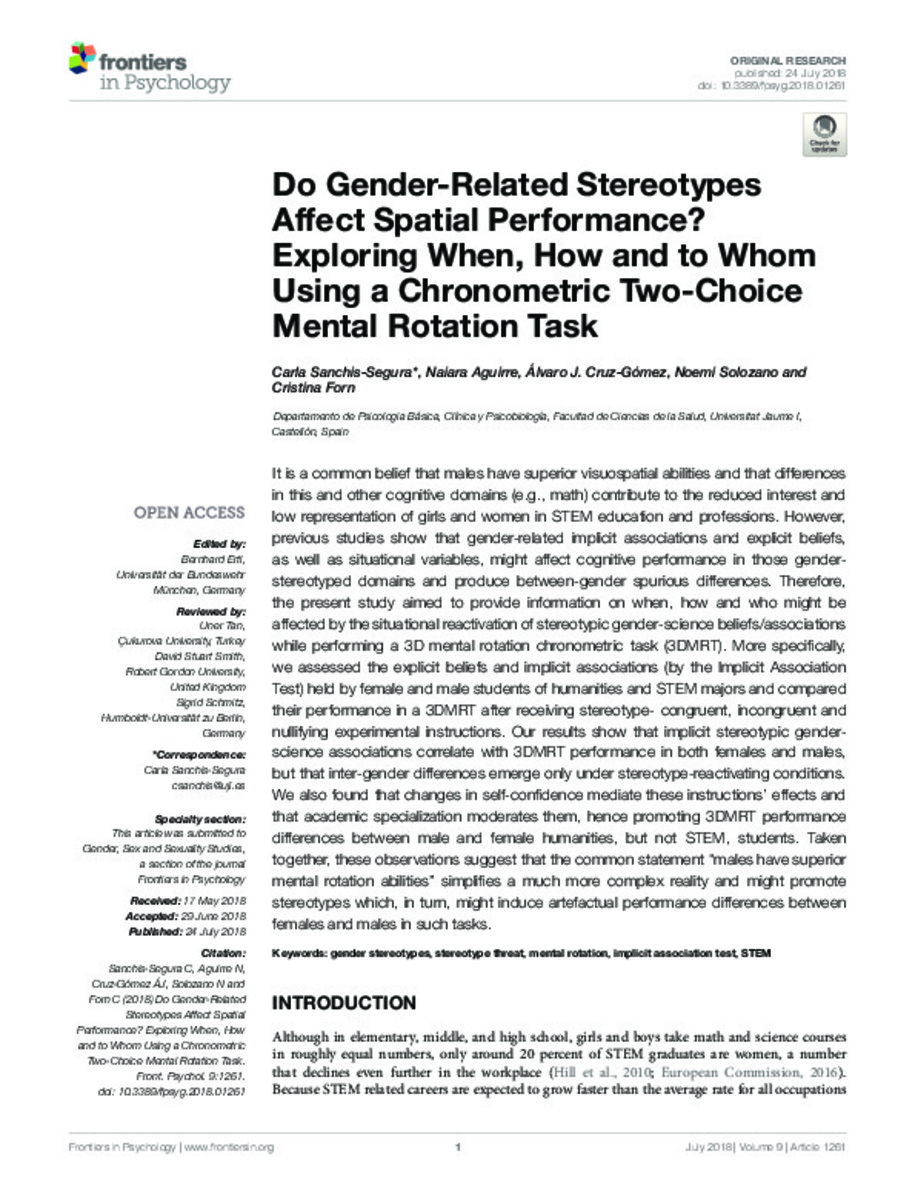Mostrar el registro sencillo del ítem
Do Gender-Related Stereotypes Affect Spatial Performance? Exploring When, How and to Whom Using a Chronometric Two-Choice Mental Rotation Task
| dc.contributor.author | Sanchis-Segura, Carla | |
| dc.contributor.author | Aguirre, Naiara | |
| dc.contributor.author | Cruz Gómez, Álvaro Javier | |
| dc.contributor.author | Solozano Belenguer, Noemí | |
| dc.contributor.author | Forn, Cristina | |
| dc.date.accessioned | 2018-10-16T09:31:50Z | |
| dc.date.available | 2018-10-16T09:31:50Z | |
| dc.date.issued | 2018-07-24 | |
| dc.identifier.citation | SANCHIS SEGURA, C.; AGUIRRE VIDAL, Naiara; CRUZ GÓMEZ, Álvaro Javier; SOLOZANO BELENGUER, Noemí; FORN, Cristina (2018). Do Gender-Related Stereotypes Affect Spatial Performance? Exploring When, How and to Whom Using a Chronometric Two-Choice Mental Rotation Task. Frontiers in Psychology, v. 9 | ca_CA |
| dc.identifier.uri | http://hdl.handle.net/10234/176779 | |
| dc.description.abstract | It is a common belief that males have superior visuospatial abilities and that differences in this and other cognitive domains (e.g., math) contribute to the reduced interest and low representation of girls and women in STEM education and professions. However, previous studies show that gender-related implicit associations and explicit beliefs, as well as situational variables, might affect cognitive performance in those gender- stereotyped domains and produce between-gender spurious differences. Therefore, the present study aimed to provide information on when, how and who might be affected by the situational reactivation of stereotypic gender-science beliefs/associations while performing a 3D mental rotation chronometric task (3DMRT). More specifically, we assessed the explicit beliefs and implicit associations (by the Implicit Association Test) held by female and male students of humanities and STEM majors and compared their performance in a 3DMRT after receiving stereotype- congruent, incongruent and nullifying experimental instructions. Our results show that implicit stereotypic gender- science associations correlate with 3DMRT performance in both females and males, but that inter-gender differences emerge only under stereotype-reactivating conditions. We also found that changes in self-confidence mediate these instructions’ effects and that academic specialization moderates them, hence promoting 3DMRT performance differences between male and female humanities, but not STEM, students. Taken together, these observations suggest that the common statement “males have superior mental rotation abilities” simplifies a much more complex reality and might promote stereotypes which, in turn, might induce artefactual performance differences between females and males in such tasks. | ca_CA |
| dc.format.extent | 17 p. | ca_CA |
| dc.format.mimetype | application/pdf | ca_CA |
| dc.language.iso | eng | ca_CA |
| dc.publisher | Frontiers Media | ca_CA |
| dc.relation.isPartOf | Frontiers in Psychology (2018), v. 9 | ca_CA |
| dc.rights | Atribución 4.0 Internacional | * |
| dc.rights.uri | http://creativecommons.org/licenses/by-sa/4.0/ | * |
| dc.subject | Gender stereotypes | ca_CA |
| dc.subject | Stereotype threat | ca_CA |
| dc.subject | Mental rotation | ca_CA |
| dc.subject | Implicit association test | ca_CA |
| dc.subject | STEM | ca_CA |
| dc.title | Do Gender-Related Stereotypes Affect Spatial Performance? Exploring When, How and to Whom Using a Chronometric Two-Choice Mental Rotation Task | ca_CA |
| dc.type | info:eu-repo/semantics/article | ca_CA |
| dc.identifier.doi | https://doi.org/10.3389/fpsyg.2018.01261 | |
| dc.relation.projectID | 1) Grant P1-1B2014-15 provided by Universitat Jaume I ; 2) PSI2015-67285-R provided by Ministerio de Educación, Cultura y Deporte ; 3) Grant UJI B2017- 05 | ca_CA |
| dc.rights.accessRights | info:eu-repo/semantics/openAccess | ca_CA |
| dc.relation.publisherVersion | https://www.frontiersin.org/articles/10.3389/fpsyg.2018.01261/full | ca_CA |
| dc.type.version | info:eu-repo/semantics/publishedVersion | ca_CA |
Ficheros en el ítem
Este ítem aparece en la(s) siguiente(s) colección(ones)
-
PSB_Articles [1312]
Articles de publicacions periòdiques








